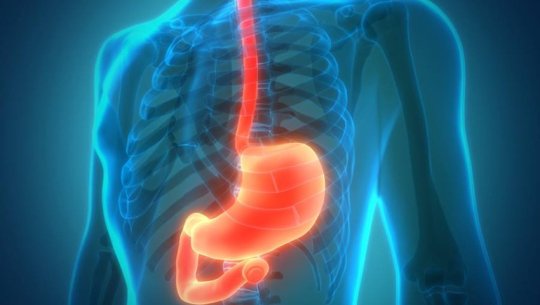#Reflux Evaluation
Explore tagged Tumblr posts
Text

Esophageal Manometry: Myths vs Facts You Should Know
Esophageal manometry is a vital, low-risk test used to diagnose swallowing issues and motility disorders. Despite its benefits, many myths surround the procedure. In this article, Dr. Rupali Bandgar-Jankar from Kaizen Gastro Care debunks common misconceptions and explains why esophageal manometry is safe, effective, and often essential for accurate diagnosis and treatment planning.
#Esophageal Manometry#Swallowing Disorders#Gastrointestinal Testing#Motility Disorders#Diagnostic Procedure#Reflux Evaluation
0 notes
Text

POST TRUMP OF INFECTIOUS AND PSYCHOLOGICAL DISEASES:
Trumpism Syndrome
Definition: A psychological condition emerging post-COVID-19, characterized by a loss of critical thinking and an intense devotion to misinformation. Symptoms include an inability to differentiate between fact and fiction, excessive political extremism, and a firm belief in unsubstantiated claims.
Treatment: Cognitive behavioral therapy and media literacy programs are recommended to curb the influence of conspiratorial thinking.
Trumped
Definition: A dermatological condition caused by prolonged exposure to excessive tanning products or lotions. This results in an unnatural, orange-toned skin discoloration, often accompanied by skin irritation and premature aging.
Treatment: Gradual cessation of tanning products and hydration therapy to restore skin’s natural balance.
Trump's
Definition: A dietary condition where excessive consumption of carrots leads to a pronounced orange tint in the skin, also known as carotenemia. This condition results from the overabundance of beta-carotene in the bloodstream.
Treatment: Reducing carrot intake and increasing hydration to flush excess carotenoids from the body.
Trumpissed
Definition: A gastrointestinal disorder caused by the overconsumption of orange juice, leading to chronic acid reflux and digestive discomfort. Symptoms include burning sensations in the chest and throat, bloating, and frequent burping.
Treatment: Limiting acidic beverages, consuming antacids, and a diet designed to balance stomach pH levels.
Trumping
Definition: A social condition characterized by excessive self-aggrandizing speech and the propagation of unfounded claims. Sufferers often engage in loud, boastful conversations that lack coherence, leading to frustration in listeners.
Treatment: Mindfulness techniques and social communication workshops are recommended for improving clarity and empathy in conversations.
Trumpitus
Definition: A state of overwhelming self-importance and egocentrism, often triggered by external validation or praise. Those affected may experience a compulsion to dominate conversations and seek constant admiration.
Treatment: Regular humility training and grounding exercises to focus on collective over individual achievement.
Trumpdosis
Definition: An addiction-like condition where individuals become excessively reliant on media sources that reinforce their personal biases. Symptoms include a disconnection from reality and an inability to critically evaluate opposing viewpoints.
Treatment: A gradual detox from biased media, accompanied by exposure to diverse perspectives and critical thinking exercises.
Trumpencephalopathy
Definition: A cognitive disorder that results from prolonged exposure to inflammatory rhetoric, leading to a significant decline in reasoning and empathy. It may manifest as an inability to engage in productive dialogue or understand differing opinions.
Treatment: Neurological therapy and a commitment to open-mindedness and intellectual humility.
Trumpathy
Definition: A psychological ailment in which the individual experiences a complete lack of empathy, often as a result of being desensitized to the suffering of others due to excessive media consumption.
Treatment: Therapy focused on emotional intelligence and learning to reconnect with others’ experiences and needs.
If symptoms persist! Ahh there's no cure.
#fuck trump#donald trump#fuck elon#elon musk#jd vance#fuck jd vance#american politics#republicans#fuck maga#fuck elon musk#fuck democrats#fuck republicans#marjorie taylor greene#us politics#congress#us congress#trump administration#disease#viral#viruses#medicine#doctor who
27 notes
·
View notes
Text
Gastro specialist in Warangal
Digestive health plays a vital role in overall wellbeing, and the need for expert care is paramount when gastrointestinal problems arise. For residents of Warangal seeking specialized care for digestive disorders, the Gastro specialist in Warangal at Prathima Cancer Institute offers expert diagnosis and treatment using advanced medical technologies.
Understanding the Role of a Gastro Specialist
A gastroenterologist is a medical expert who specializes in diseases of the digestive system, including the esophagus, stomach, intestines, liver, pancreas, and colon. These specialists diagnose and manage a wide range of conditions such as acid reflux, ulcers, hepatitis, inflammatory bowel disease, and cancers affecting the gastrointestinal tract.
Access to a skilled Gastro specialist in Warangal ensures that patients receive personalized care, early diagnosis, and appropriate treatments to manage complex digestive disorders effectively.
Why Choose Prathima Cancer Institute for Gastroenterology Care?
Prathima Cancer Institute is renowned for its comprehensive cancer care, but its gastroenterology department also stands out for excellence. The institute boasts:
Experienced gastro specialists including Dr. Avinash Tippani, known for his expertise and compassionate approach.
Advanced diagnostic facilities such as high-definition endoscopy, colonoscopy, and imaging techniques to ensure precise evaluation.
Comprehensive treatment options ranging from medical management to minimally invasive procedures and surgery.
Integrated care involving oncologists and surgeons for patients requiring complex treatment.
Choosing a dedicated Gastro specialist in Warangal at Prathima Cancer Institute means patients benefit from multidisciplinary expertise and personalized attention.
Diagnostic Excellence
Early and accurate diagnosis is key in managing gastrointestinal diseases. The gastroenterology team uses state-of-the-art technologies including:
Upper and lower gastrointestinal endoscopy for direct visualization of digestive tract abnormalities.
Endoscopic ultrasound for detailed imaging of organs and detection of tumors or lesions.
Colonoscopy for screening and removal of precancerous polyps.
Liver function tests and imaging for early detection of liver diseases.
These advanced tools allow the Gastro specialist in Warangal to develop effective treatment plans tailored to each patient’s needs.
Comprehensive Treatment Services
Prathima Cancer Institute provides a full range of treatment services for digestive disorders:
Medical therapy for acid reflux, ulcers, hepatitis, and inflammatory bowel disease.
Endoscopic procedures such as polyp removal, stenting, and biopsy with minimal discomfort.
Surgical interventions for gastrointestinal cancers and complex conditions.
Nutritional support and counseling to complement medical treatment.
The multidisciplinary approach ensures that patients receive holistic care under the guidance of experienced gastro specialists.
Patient-Centered Care and Support
Understanding the emotional and physical challenges of digestive diseases, Prathima Cancer Institute offers counseling, nutritional advice, and pain management services. This patient-focused approach improves recovery outcomes and enhances quality of life.
Accessibility and Convenience
Located in Arepalli, Warangal, Prathima Cancer Institute is easily accessible for patients across the region. The institute also participates in government health schemes and insurance programs to make specialized gastroenterology care affordable.
Conclusion
For anyone seeking a trusted Gastro specialist in Warangal, Prathima Cancer Institute offers unparalleled expertise and comprehensive care. With cutting-edge diagnostics, expert physicians like Dr. Avinash Tippani, and a patient-first philosophy, the institute is a premier destination for digestive health in Warangal.
If you or your family members are experiencing gastrointestinal symptoms, schedule a consultation with the Gastro specialist in Warangal at Prathima Cancer Institute today.
#healthcare#hospital#hospital in warangal#medicine#cancer#cancerhospitalsinwrangal#prathimacancerhospitals#hospitalcare#health#prathima cancer institute
2 notes
·
View notes
Text
Here are a list of campaigns for Sudanese families that have been vetted by @/bsonblast. You can find her on tiktok, instagram, and twitter.
Help a family of 13 evacuate Sudan ($40/$20,000)
Daniel has organized this campaign to help his friend and their family evacuate Sudan. They are a family of 13 in need of help covering travel expenses, rent, and medical treatment.
Help a Sudanese student finish med school ($2,085/$2,500)
Sara Ibrahim is fundraising for her friend who is currently stuck in Omdurman with her family. After the death of her friend's father, her family is having financial problems affecting their ability it relocate from Omdurman and her ability to finish her last year of Med school.
Help Refugee’s escape Sudan Conflict ($7,157 CAD/$31,000 CAD)
Sai is raising funds to help their family members evacuate from Sudan. There are 10 family members total, including 7 kids, with the youngest being 4 years old.
Safe Passage ممر آمن- Help a mom and her kids escape war ($3,054 CAD/$5,000 CAD)
Life in Sudan has become a series of harrowing escapes for a single mother and her two teenage children. They have been forced to flee their home three times to evade the violence of the ongoing conflict. This fundraiser aims to help cover their travel fees and living costs of their evacuation to Uganda.
Help Abudjana rebuild after war (£2,769/£5,000)
Abudjana Mohamed is a 19-year-old electrical engineering student from Sudan. Thanks to the fundraiser, he has already obtained a new passport and traveled to Ethiopia where he is applying for a visa.
Abudjana has also been accepted into a 4-year Bachelor of Science in Electrical and Electronic Engineering Program at the Islamic University of Technology (IUT) in Bangladesh on an OIC Partial Scholarship. The gfm aims to help cover the rest of his tuition.
Support a Community Stuck In Sudan ($11,722/$40,000)
Abeer and her family have been displaced 8 times due to violence from the RSF Militias. They are currently in Northwest Kordofan, where there is a severe lack of food, medicine, water, and hygiene products. The funds will be used to help her family (which includes 15 children, 2 babies, 10 women, and 5 elders) move to a safer place and then hopefully evacuate. The rest of the money will help provide others with food, clean water and medicine.
Emergency fund for Sudanese Family ($22,331 CAD/$25,000 CAD)
Seme Obied is raising funds for a Sudanese family looking to relocate. The money will help the family cover necessities, travel expenses, rent, and settle debts.
Help Aalaa evacuate and get treatment for her mother ($5,288/$20,000)
Aalaa is trying to evacuate her family from Sudan. Her mother has several health concerns, including gastroesophageal reflux disease (GERD), migraines, and back problems that have been worsened by the war in Sudan. Aalaa's mother needs to be evaluated for surgery and to resume her treatment.
Help Sajida and her family evacuate from Sudan ($31,105 CAD/$50,000 CAD)
Hassan Saeed has organized this campaign to help evacuate Sajida and her family from Sudan. Her father died years ago, so it's just been her and her mother having to care for her younger siblings .
17 notes
·
View notes
Text

Picky Eater Type 5: The Gagger
Your 4-year-old eats a grand total of seven foods. When you're successful in persuading them to try something new, they always gag—which is unpleasant for both of you. It makes them less likely to try new foods and you less likely to serve them. What's Going On: For many kids, gagging can be a sign that mealtime has gotten too stressful. Your child may be having a dramatic reaction to efforts to "get" them to eat. Dr. Rowell adds, "If he has had difficult, unpleasant, or painful experiences related to food, such as severe reflux, constipation, a scary choking episode, or coercive and forceful feeding, that can be a factor too." However, frequent gagging could also be a red flag that your child has oral-motor or sensory issues. Oral-motor skills refer to a child's ability to move their lips, jaw, tongue, and facial muscles in an age-appropriate manner. "If your child has a sensory issue, he may either under- or overreact to a sense," Melanie Potock explains. "He may think he needs to stuff his cheeks with food in order to truly feel it in his mouth or gag at the slightest change in texture." What To Do About It: To explore whether your child has an oral-motor or sensory issue, talk to your pediatrician. A referral to an occupational therapist, a speech-language pathologist, or a pediatric dietitian who specialize in feeding difficulties may be the next step. Known as feeding therapists, these pros will review your child's feeding history, growth, and development and evaluate their eating behaviors and skills in various situations. They may coach you on how to help them at home—or work with them directly with techniques that should be both gentle and fun—to gradually overcome any challenges. (Many insurance plans cover this treatment.) If you rule out an oral-motor or sensory problem, try involving your child with the food at the table without any pressure. One of Potock's favorite strategies is to make your child the family's "master server." Rather than passing serving bowls around, put them in front of them with a big serving spoon and a smaller spoon in each dish. Have your child ask each family member, "Do you want one scoop or two? A big scoop or a small scoop?" then put the requested amount on each person's plate. "This way, he's exposed to the food through his eyes, ears, and nose before ever tasting it," Potock says. "The added sensory exposure may help pique his curiosity and make mealtime fun instead of stressful. Plus, with a small spoon as an option, a child is more likely to put a little on his own plate."
Text by Stephanie Wood, illustration by Teddy Yang, published by Parents.com https://www.parents.com/toddlers-preschoolers/feeding/picky-eaters/the-picky-eater/
2 notes
·
View notes
Text
Gastroenterologist
Understanding the Role of a Gastroenterologist in Digestive Health
If you've ever experienced persistent stomach issues or discomfort, you might want to consult a gastroenterologist. These specialists focus on diagnosing and treating conditions affecting your digestive system, including the stomach, intestines, liver, and gallbladder. With an extensive education that includes years of specialized training, gastroenterologists are equipped to handle a wide range of gastrointestinal disorders.
From heartburn and irritable bowel syndrome to more serious conditions like Crohn's disease and liver disease, a gastroenterologist can provide insight and treatment options tailored to your needs. Understanding when to seek help from a gastroenterologist can be crucial for maintaining your digestive health and overall well-being. Whether it’s routine screenings or complex treatments, knowing what a gastroenterologist can do for you can make a significant difference in your health journey.
Role of a Gastroenterologist:
Gastroenterologists play a crucial role in diagnosing and treating a wide variety of digestive system conditions. These specialists focus on your gastrointestinal tract and associated organs to improve your digestive health.
Diagnosis and Treatment:
A gastroenterologist uses various diagnostic tools to identify gastrointestinal issues. These tools include endoscopies, colonoscopies, and imaging tests.The gastroenterologist conducts a comprehensive evaluation of symptoms, including abdominal pain, bloating, and alterations in bowel habits.. They develop tailored treatment plans to address conditions such as irritable bowel syndrome, lactose intolerance, and gastrointestinal cancers. Medications, lifestyle changes, and, when necessary, nonsurgical procedures are common strategies in managing your digestive health.
Patient Care:
Patient care is a priority for gastroenterologists. They create a comfortable environment where you can discuss your concerns candidly. Building a trusting relationship helps facilitate effective treatment. Your gastroenterologist educates you about your condition, offering insights into necessary lifestyle modifications and dietary adjustments. Regular follow-ups ensure your treatment is effective and that any new symptoms are promptly addressed. By prioritizing your digestive health, a gastroenterologist enhances your overall well-being.
Common Gastrointestinal Disorders:
Several common gastrointestinal disorders can affect your digestive health. Gastroenterologists specialize in diagnosing and treating a wide range of these conditions.
Gastroesophageal Reflux Disease (GERD):
Gastroesophageal reflux disease (GERD) occurs when stomach acid frequently flows back into your esophagus. This results in manifestations including heartburn, chest discomfort, and regurgitation.. Risk factors include obesity, pregnancy, and certain food sensitivities. You might find relief through lifestyle changes like dietary modifications, weight control, and avoiding triggers. Gastroenterologists often recommend medications, such as proton pump inhibitors, to manage symptoms effectively. In severe cases, surgery may be necessary to strengthen the lower esophageal sphincter and prevent acid reflux. If you experience persistent heartburn or other GERD-related symptoms, consulting a gastroenterologist provides guidance for effective treatment options.

Inflammatory Bowel Disease (IBD):
Inflammatory bowel disease (IBD) consists of chronic conditions like Crohn's disease and ulcerative colitis that cause inflammation in your digestive tract. Symptoms of IBD include abdominal pain, diarrhea, fatigue, and weight loss. Factors contributing to IBD include genetics, immune system dysregulation, and environmental triggers. Management of IBD often involves medications aimed at reducing inflammation and enhancing symptom control. Your gastroenterologist may prescribe aminosalicylates, corticosteroids, or immunomodulators based on your specific condition. Adopting a balanced diet and, in some cases, lifestyle adjustments can also aid in symptom management. Early intervention and ongoing care from a gastroenterologist are crucial for managing IBD effectively.
Qualifications and Training:
Gastroenterologists undergo rigorous education and specialized training to proficiently diagnose and manage disorders of the digestive system.. This multi-phase educational journey equips them with the necessary skills to provide high-quality patient care.
Education Requirements:
To become a gastroenterologist, you first complete a four-year college degree followed by four years of medical school. After medical school, you enter a three-year residency in internal medicine, which allows you to train alongside experienced gastroenterologists. The combination of classroom education and practical training establishes a solid foundation for your future practice as a gastroenterologist.
Certifications and Specializations:
After completing your residency, you enter a two- to three-year fellowship in gastroenterology. This specialized training is dedicated to the examination and treatment of gastrointestinal diseases and associated procedures, which encompass advanced endoscopic techniques. Once you finish the fellowship, you must pass the Gastroenterology Certification Exam provided by the American Board of Internal Medicine. Successful completion of this exam grants you board certification as a gastroenterologist, signifying your advanced expertise in the field. Some gastroenterologists may pursue additional subspecialty training in areas like pediatric gastroenterology or transplant hepatology, further enhancing their skills and knowledge.
Future Trends in Gastroenterology:
Advancements in gastroenterology focus on improving diagnostics and treatments. Enhanced understanding of the gut microbiome could lead to personalized therapies for various gastrointestinal conditions. Gastroenterologists explore manipulating the microbiome to optimize health outcomes.
Artificial intelligence (AI) integration enhances real-time decision-making during procedures. AI algorithms assist in interpreting data, improving accuracy in diagnoses and treatment planning. Implementing AI can streamline workflow and reduce the likelihood of errors.
Telemedicine also transforms patient care, allowing you to consult with a gastroenterologist remotely. This trend expands access to specialists, particularly in underserved areas. Virtual visits facilitate ongoing monitoring and support for chronic conditions.
Furthermore, ongoing research aims to develop less invasive diagnostic methods. Techniques such as capsule endoscopy continue to evolve, providing improved visualization of the digestive tract. These trends signify a positive trajectory in gastroenterology, ensuring comprehensive care and innovative solutions for digestive health.
Conclusion:
Your digestive health is vital to your overall well-being. Consulting a gastroenterologist at Gastro Center of Maryland can make a significant difference in managing any gastrointestinal issues you may face. With their specialized training and expertise, these professionals are equipped to provide tailored treatment plans that address your unique needs.
As advancements in the field continue to emerge, staying informed about your options is crucial. Whether it's through innovative diagnostics or telemedicine, accessing the right care has never been easier. Don't hesitate to reach out to a gastroenterologist if you experience persistent symptoms. Prioritizing your digestive health today can lead to a healthier tomorrow.
Frequently Asked Questions:
Does a gastroenterologist do colonoscopies?
Yes, gastroenterologists perform colonoscopies. This procedure allows them to examine the lining of the colon and rectum using a flexible tube equipped with a camera. It helps diagnose various gastrointestinal conditions.
What is a doctor of the liver called?
A liver specialist is called a hepatologist. Hepatologists focus specifically on liver diseases, such as hepatitis, cirrhosis, and liver cancer, and often work closely with gastroenterologists.
What tests will a gastroenterologist do?
Gastroenterologists may perform several tests, including endoscopies, colonoscopies, imaging tests like ultrasounds or MRIs, and laboratory tests to diagnose digestive disorders. These tests help identify the underlying issues affecting the gastrointestinal system.
Why would I be referred to gastroenterology?
You may be referred to a gastroenterologist for persistent or severe digestive symptoms, such as recurring heartburn, unexplained weight loss, abdominal pain, or changes in bowel habits. Early consultation can aid in effective diagnosis and treatment.
Reach out to our website to get more info about Gastroenterologist Near Me
Find Us On Google Map ( Gastro Center of Maryland )
1 note
·
View note
Text
Vampire: the Requiem (2e) Readthrough Review (Repost)
About eighteen months ago I picked up the second edition of Vampire: the Requiem and, while laid up with the first instance of mortifying acid reflux (it would not be the last) I decided to do a full readthrough review. Then I went insane and deleted my accounts at least once. But! Wayback Machine to the rescue! The text survives and here it is again.
I don’t want to make too many comparisons to Vampire: the Masquerade because “is it better?” comes up every couple of weeks on the White Wolf RPG subreddit and has done for years and I’m tired. I want to talk about Requiem on its own merits where I can. That said, I cannot avoid being an old hand who knew VtM first and has been playing V5 for two years: I’m bound to evaluate what I discover in terms of what I already know.
Images are from the book in question, sourced via the Storytellers’ Vault, spirit of fair use, purely for illustrative/visual handhold purposes.
A Date with the Night: world building
The onboarding is solid, with the key questions asked and answered (in sightly purple prose, but still):
what do we do in this game? (we predate, but we also philanthropise, we also party: we are trying to be something other than a machine that eats blood forever)
what’s the internality of the characters like? (who you are as a vampire is precariously balanced with who you pretend to be as a human and you need to do both, in very practical terms)
what’s the core conflict? (Strix have existed for as long as Kindred have, they are the old-school pre-literary revenant vampires, and they hate you) (VtR 1e was pretty bad at this, it didn’t have a fallback for when your brain wouldn’t turn over, and the Strix answer this need: when you don’t know what to do with your players, throw a Strix at them)

Clan presentation, again, really good. The focus on what kind of predator they are, how the human experiences them; the range of example personas presented; the recommendations on stats, sweet Jesus yes, it’s about damn time. The game explicitly says “hey this signature power uses those numbers and this one uses these, bear that in mind, here’s what priorities here or there on the sheet might look like as a character so you’re not feeling like the system mastery has crowded out your vision.”
Covenant presentation is a bit weaker; it doesn’t feel anchored into the processes of gameplay to the same extent, there isn’t that “hey, you’re Lancea et Sanctum, here are some Merits you might want to consider” – I don’t know why that might be yet but it feels a bit lacklustre after the very table-focused material on the clans.
I do like how the clan origin stories and the extinct clans and covenants suggest a metaplot without beating me over the head with it. There was a thing called the Camarilla in Rome, it was the first proper vampire society, it fell apart because historical pressures but also Strix, it survives in these ways. But there’s no Grician bias stuff here – no specifics for the brain to snag and snare upon, no numbers and no iconic signature characters into whose biography the game texts can deteriorate.
As I read it I’m thinking “OK so how does that plug into the European history I’m interested in exploring, how far from Rome are we here?” or “OK but how does this place much further away talk back to any of that, we’re beyond the frontiers of Rome with this one, did they ever have a Camarilla or are we looking at Circle-Town from the year dot?” The covenants feel inspiring from a storytelling perspective but in terms of character generation they’re not quite made concrete.
The All Night Society is an in universe introduction to setting concepts like the Traditions, the processes of hunting and ghouling. I find this sort of thing accessible enough but there are bits where I’d like to be told how it works. The Cacophony, for instance: I can grasp the idea from this impressionistic and dreamlike prose, but mine is not a life of underground parties or graffiti tags, and I could do with this shit translated into Parochial Geek through the medium of concrete, at-table example. Just walk us through how it manifests in an example of play. Oddly I don’t get the same effect from Solace even though I’ve never been a habitual drug user.
There’s a shadow of things to come, with the spread on feeding grounds and havens, but it isn’t reified with recommended Backgrounds to represent that stuff. (I stand by Predator and Coterie Types as the quiet best innovation of V5, by the way, more definitive of how you do vampirism than any amount of sect allegiances.) All in, it’s a good chapter for hooks and eyes.
Building a Monster: chargen (and rules) (and then chargen again) (but also reference)
Laws of the Dead runs pretty long – character generation and all the Disciplines are in here. I’m going to stat up my old character (since I lost his sheet anyway and didn’t really know what I was doing when I made him) along the way for another perspective on all this material.
Aspirations are a useful early feature: pick three things your character wants to achieve in the game, one or two relating to Kindred existence and at least one relating to the human world. Characters need to want things, not just “be rounded” by events in their past – they need to be moving toward events as yet unresolved. Personally I think it should be one pre-mortem one post-mortem and one space to allow emergent gameplay, as I always end up going off down some strange tangent for session after session and then feeling bad because it’s not what I told the Storyteller I wanted to do with the game.
Adrian Royce is a Ventrue and a member of the Carthian Movement: his concept is “Weird Left Zine Correspondent”. His human-facing Aspiration is to pay off an enormous debt – he dug a deep deep hole of expenses researching his first book and he’s got to square that somehow. His Kindred-facing Aspiration is to uncover a secret that gives him leverage over/among his fellow Ventrue – I imagine he’s a bit shit by the clan’s standards, a wrong side of the tracks Embrace for all that he’s the best possible version of himself.

I’ve always liked the nWod/CofD “grid” of Attributes – cross-reference the kind of challenge (mental, physical or social) with the approach being taken (power, finesse, resistance) and you’ll know exactly which one to roll in a given moment. Couple that with a robust “let’s think about what this word means” approach to the Abilities and you’ll be calling the dice pools with confidence in no time. It does help to be up front about this approach, defining the Traits with players, just in case they think seducing someone is a Subterfuge roll by default when you see dice pools more as “what are you trying to achieve with this seduction – do you want to make someone believe you because you’re hot, or do you want something material out of it?” kind of decision.
Adrian isn’t a particularly finesse-oriented person – he gets what he wants through force of personality, occasional acts of violence, and sheer tenacity. He’s not particularly smart, although he works hard. Social prime, then Physical, then Mental. Mental Skills take a higher priority though, he’s well trained and makes up for his lack of exceptional smarts with a rigorous approach to investigation. Physical gets bumped down: he can handle himself in a fight and he’s picked or planted the odd pocket in his time, but he’s nothing spectacular. His specialties are in Investigation (Conspiracy Theories), Expression (Journalism) and Brawl (Boxing) – I’ve decided he has a hobby that makes him a little bit tastier in a scrap. His clan gives him an extra dot in Presence, which is a nice way to pick up a four-dot ability without sacrificing anything else, or compensate for a sacrificed dot somewhere.
Beats kind of sneak into the middle of character creation. These are super important as beats – as in story beats – convert into experience points. From the sessions I played a few years ago I remember beats coming thick and fast, a core part of the gameplay loop. Is the list of things that give a beat on the Storyteller Screen? It is not (they needed that space for half a page of grappling rules, obviously).
New Disciplines are sensibly gatekept – the clans’ unique Disciplines require a teacher and a sip of the ol’ vitae, the covenants’ unique Disciplines require a teacher, everything else is up for grabs.
There’s a list of archetypal Masks and Dirges (your pretend human self and your real Kindred self, respectively) that restore all or one of your Willpower points when you live up to them (I’m hoping Willpower is the ‘extra dice’ ‘reroll’ or ‘auto success’ generator it’s been in other versions of the game – I honestly forget how that works – but there’d better be lots of incentives to spend it!).

Touchstones appear here, but they’re both a little more nuanced (it’s acknowledged that they can be a place or a thing, although a glance at the ST screen has revealed that spending time around humans is mechanically enforced by the Requiem rule set) and a lot more developed (there’s a good two pages of examples for you to build off, why the hell didn’t V5 do this?).
I’ve adapted the “Former Patron” for Adrian. He has a close friendship with a ‘zine editor, the only person who’ll consistently employ him and pay him steady money for whatever he turns in on or about the deadline. Ricky – for ‘tis his name – isn’t stupid, he knows Adrian is Kindred, but he’s taken a “don’t ask don’t tell” approach and Ade is grateful for the mercy, since not being asked means he doesn’t have to lie.
At this stage we get into a cluster of more in-play rules, and…
On the whole, page for page, this book is beating V5. The layout is sensible and consistent, the art assets aren’t gratuitous, the artified text boxes generally draw the attention to a key idea summarised in direct and emotive text, and I haven’t ever had to follow two ongoing arguments across two sets of different coloured columns in a six column spread. But the information flow through chapters is just as bad as V5, and really shits the bed at this point: I’m trying to make a character and there’s page after page of core gameplay activities in the middle of the chapter between Touchstones and Merits.
If I’m walking someone through chargen and getting them to read the words so they understand what they’re doing with the dots (instead of just learning the summary and not really doing the process in full depth) this is bad, because it breaks flow and we lose momentum and concentration. If I’m looking for a rule during play, this is bad because core activities are clustered up in the middle of a section about something else and there’s no marshalling of information onto spreads or anything. This is just about acceptable in a PDF, with search and hyperlink at your side, but it’s rubbish in a physical book.

We get into the rules for damage, and for vitae, and the Blush of Life casually tosses off that for one (1) vitae, vampires can keep a meal down for most of the night, or have sex. That’s that. No lengthy “at Humanity 4 you can’t get it up but you can fingerbang” granularity. Neat and tidy. It’s just another biological thing they might need to do sometimes.
Predatory Aura is also neat: an explanation for just why Kindred society has all these customs and all that elaborate rigmarole. Kindred know Kindred; the Beast stirs, and can be incited to lash out. This is the bare-fangs-and-hiss routine; this is the stagey, theatrical sexuality; this is the sneering and posturing behind polite words. And it’s got some simple, hard and fast rules keyed to Willpower and Power Attribute rolls. And it gets past the "how do I know that you're a vampire?" stage in meeting the NPCs. Do like.
Rules for posthumous Embraces and the rise of the corpse as a Revenant – nice touch. Another threat that can find its way in should the session or story need some sizzle, as anyone who’s been bitten can rise if they come into contact with vitae after death or are fully exsanguinated on a later feeding (which is how we get the Lucy-in-Dracula moments). Lovely stuff.
Feeding is in here: there’s the simple way, and the “well, you have to grapple first” combat option (ahh, that’s why grapple rules ended up on the ST sheet – but the beats would have been nice to have!) And certain chestnuts about blood and vitae are described explicitly: the physical fluid nourishes more or less depending on where it comes from, so different amounts are needed. I wish the exact processes and amounts were on the goddamn sheet (I won’t need weapon damage in every session, but I will definitely need feeding!) though. Finally an example of play as well, to cover the no-dice feeding option, which definitely needs it.
I’m going to stop complaining about the stupid ST sheet eventually, but why isn’t the frenzy modifier chart on there? Frenzies can come up in any scene, god damn it…

There’s a long and disorganised list of Merits. Some of them – the Carthian Merits I’m trying to pick out for Adrian – come in multiple tiers and I can see the shape of the Loresheet system from V5 in there. They seem to have been sorted by “Kindred only” and “Mortals can take these too” but they’re the wrong way round (I’d put bedrock stuff like Contacts and Status up front, since a lot of the Kindred ones refer to these or have them as prerequisites). Also, the lack of sub-sorting means that if, for instance, I’m building a Carthian, I have to flip back and forth a lot just to figure out what all my options are and what I need to chain into this or that to make them go. Chalk this up to something Masquerade has always done better (either by skimming specific ones off into clan and sect supplements, or dumping a lot of them into an optional appendix and having the core focus on the important Backgrounds that locate your character in the world).
Adrian has ten Merit points to spend. I’m going to start with Human Merits, because they’re more concrete bread and butter assets like “living indoors” and “having money”, and go into the weeds of Kindred Merits once I’m happy that he’s grounded. He has a dot in Allies, representing the activist community who know and tolerate him because he occasionally turns up something extremely useful. Area of Expertise (Investigation) makes him really good at that due diligence and Barfly will help him blend in when he’s doing the legwork. True Friend doubles down on his relationship with his Touchstone, Ricky T: Adrian strikes me as a hard man to like, but faithful to the bitter end in return. Finally, I’m going to buy him some Carthian Status as a prerequisite to his Kindred Merits: I’m starting to feel like Adrian’s a bit of a sofa surfer, leeching off his covenant and repaying the favours with hard graft and the occasional truth bomb. Carthian Pull and I Know A Guy will work for this at low level, giving him access to the odd low tier ‘background’ dot in exchange for a story-generating favour. I have one dot left and pop back to the Mortal list to pick up Trained Observer, just to lean harder into that “works hard, pays attention” feel.
The chapter closes out with Disciplines, which I am absolutely not going to talk about at any length. I’m just going to remark that the multiplying XP costs of other Vampire iterations are long gone, that Devotions (what I know as Amalgams) are sidepieces with an experience cost based on the number of dots that go into them, and that every Discipline has a stat+skill+discipline pool as standard.
As a Ventrue Adrian has access to Dominate in-clan, so I’m going to go hard on it as his unique selling point. Two dots there give me the simple four word command and the option of chaining three of those together into a series of instructions or extended control. His dice pool for it isn’t great, so I go back and swap his Attribute priorities; three dots in Intelligence to make the Discipline go. Looking at his dots now, he’s got a powerful intellect and forceful personality but he’s not very quick or delicate in his approach, and while he can throw hands if he has to, he probably treats them a bit too much like an amateur boxing ring and starts shit he can’t finish. He gets a dot in Resilience to round him out, and give him a chance to stay on his feet in these tight spots.
And we’re done. That took longer than I’d have liked, largely because this felt like three chapters (some core rules, the Disciplines writeup and character generation) rammed into one poorly-organised whole. The writing is on point, the layout is good, the art assets are unobtrusive and feel relevant, but the flow is all over the place and I suspect it’ll be actively annoying to refer back to this section in play. At least now I know where things are.
Playing With Your Food (game rules) (the rest of them)

Rules of the Night (hopefully this will go a bit faster!)
Usual stats-n-skills breakdown, but I like the suggested equipment and sample actions that come along with each skill to guide use of them – that should avoid the dead dots problem where someone takes dots in Etiquette and the chronicle never uses it, since it’s a player’s responsibility to suggest things like dice pools in order to move the story along. (I mean, Etiquette is a tiered Merit here, but you get the idea.) A very good page and a half on commonplace activities and their dice pools, which is built into the section on dice rolls and doesn’t make weird claims about what kind of fuckin’ is good fuckin’ (V5, take note!). I don’t always like these (as I’ve said, sometimes seducin’ someone is Charisma and sometimes it’s Manipulation, the approach and desired outcome should set the pools) but if people want a usual roll, there it is.
Social Man… eo… that word I can’t spell
Good things about this system: it’s specifically for players to use on non-player characters.
Bad things about this system: it introduces trackables in the shape of Goals and Doors that need to be calculated, modified, and tracked in a long chain of rolls that may take days of in-game time to fully resolve. It’s a very roundabout way of figuring out how many rolls of varying types are involved in the extended task of getting someone to do what you want. It does reduce down to a formula (take lowest of Resolve or Composure, add 2 if a breaking point would be met, add 1 if an Aspiration would be thwarted, add 1 if a Mask would be compromised, you need that many successful rolls – not successes – to get what you want) and I like the concept of introducing not-social rolls to the process (on the grounds that fixing someone’s garage door will make them like you more and feel indebted to you) but it all feels a bit protracted.
There is the shape of something good here but I dramatically prefer the approach V5 takes of introducing Social Conflicts with Willpower as a “damage tracker”, resolvable in three rounds, each of which can be instantaneous or protracted.

Combat is fine, it’s the usual stat + skill – target’s defence dice pool. Dodging doubles your Defence and turns it into a dice pool you roll against your attacker, which I’m not sure about the odds on. I think I’d rather have the blanket dice penalty imposed on an attacker’s pool as not letting them roll dice is surely better than rolling my own to see how many 30% chances of cancelling out their dice I can muster. Perhaps Dodge is there because people roleplaying fight scenes want to be able to dodge, because they don’t want their character to throw hands. That seems more likely.
I am going to do another “V5 did this better” – I am trying to rein it in, I swear, I know this is an older game – and say that V5 has the only initiative system I will ever accept as better (for my theatre of the mind playstyle) than “just start with the player on my left and work around the table”. Instead of all this “roll dice add character trait bonus subtract weapon malus” stuff V5 works off the dynamics of the scene, ticking down through existing close combat between already engaged parties, then ranged, then fresh close combat, then everything else. This works because what’s important isn’t the realistic simulation of real combat or the random factor: it’s building scenes in a way that makes sense and helps everyone grok what’s happening and serves to organise who rolls dice when and in what order turns are taken.
Equipment is more granular than I’m used to but I don’t entirely hate it: it’s things that are useful, expressed in terms of the Merits needed to acquire them, and I think that’s a better way of using Merits than the rather vague “I have Resources 5 so I should be able to hire NPCs to do everything for me”. Availability is a dot rating which you can match with Merits or successes from rolls – so if something’s Availability 4, you need Resources 4 or you’re rollin’ to see if you can blag it somehow.
Conditions get bumped into an appendix for ease of reference. I’m ambivalent about these. Once you’ve got them into your head they’re probably fine but it might well be easier to just say “characters affected by this mind whammy get a -2 to Social Resistance rolls” than constantly cross-referencing to the Mind Whammied condition. I feel these work better with the reference cards – something tactile you can toss across the table so a player can refer to it, and hand back when it’s done – but I forget what it was like trying to wrangle them on Roll20.
The World Against Us (adversaries, locations and ref advice)

The World We Die In takes us through a series of sample domains: Athens, Beijing (with a localised version of the Ordo Dracul), Berlin, Montreal, North Carolina (with a Jiangshi clan that remind me of the very heart of the old Wan Kuei from VtM), San Francisco, Swansea (Swansea?), Tokyo (with localised covenants – zaibatsu – replacing the familiar five)… I think this is a nice answer to “Requiem has no lore” and “Catholics and pagans are not global phenomena you Eurocentrist pillock”, which are pain points I've heard in more than a few of my Masquerade groups.
Storytelling is a busy but focused chapter, which talks about how to emphasise each aspect of play – Mask and Dirge, Aspiration, Blood Potency, Vitae, Conditions and so on – offering a Twist for each one that really brings it out of the morass of play. My favourites are the Vitae Twists with tokens passed across the table and no numbers said aloud when feeding, and an option to say “chuck the character sheet, Vitae are dice, you can roll as many as you want, but when you’re running low, you must feed”, with damage coming out of the Vitae pool as well, and a five-dice no-control Frenzy at the bottom. (I really like this one, it’s the most… vampirism is all that matters… of the whole lot so far.) I’d use that with the Blood Beats twist as, let’s face it, conventional experience doesn’t really matter here, what matters is accumulating experience to become More Vampire by adding Blood Potency.
I also like the Twist to replace health trackers with Conditions applied as characters take hits. The mathematics involved seems like it doesn’t so much replace the health tracker as add a layer to it – I think I’d base this on margins of success during combat rolls rather than doing sums to see how much each character can take.
And there’s a really neat mode for character generation – a 12 step programme for fleshing Your Dude out with the other players and the storyteller, basically a collaborative relationship map that you build during character creation. I love group character creation and I also like when players bring me NPC ideas. Colour me pleased with this. I’d want to do this before even putting dots down; basically, concept, then Climbing the Ladder, then building the characters and setting.
An appendix for ghoul characters (with unique ghoul merits – for the first time ever I might actually think a ghoul chronicle is worth doing, as an extended Prelude), an appendix for conditions, and we are done!
Would I run this? Yes. It’s not perfect – the information flow of the rules is all over the place, especially interrupting the character generation is a no-no, and I really don't like Doors – but those are the only two tooth-grinders, so it’s walking in with a credible 7/10.
Additional, after the fact: I did end up running half a V:tR story, and came to the conclusion that Requiem has some incredible ideas about how vampires work but doesn't quite boil them down into efficient systems, at least not ones that I can run over Discord. With a face to face group and a deck of Condition cards and tokens to track feeding it would probably be easier to do. I do think it's superior to V5 on at least one systemic front though, and that's with Humanity... which we will come to very shortly.
#vampire the requiem#vtr#game review#rulebook review#readthrough review#self repost#don't be mentally ill and delete your accounts folx
16 notes
·
View notes
Text
hey! my name is bedbug. ill tell you about all my woke radical left blue hair and pronouns labels/identities under the cut 🦗🍖
i speak english, spanish, and im learning mandarin! i hope to be a polygot one day.
the goal of this account is to share my experiences as a disabled teenager in america! i hope through my story others will seek professional diagnosis and treatment, or whatever they may see is best for them...!
(psst: i quit physical therapy! treatment isn't for everyone.)
ahhh also i love anime, superheroes, and horror :P

***
i use any pronouns (including neos!!!!), but appreciate she/he/it the most. im a black genderqueer omnisexual socialist/marxist.
i have juvenile sjögren's syndrome and i am in evaluation for arthritis & lupus. i do not use a mobility aid and hopefully ill never have to.
along with these (symptoms): chronic pain, chronic dry eye, chronic dry mouth, chronic dry "🐱", joint pain and stiffness, muscle pain, eczema, acid reflux... the list goes on.
you read that right! i have a chronically dry vagina! i will be talking about that here, so if my unconventional symptoms make you uncomfortable then skedaddle 🖕🏿😽
i am diagnosed with depression, pmdd, & anxiety. i am not diagnosed with ADHD, BPD/NPD, C-PTSD and OSDD, however after extensive research and consulting professionals, i have reason to believe i might (also ive talked to some "parts" before so it's either that or auditory hallucinations).
(i am medically recognized to have C-PTSD & OSDD, just not diagnosed)
i am a victim/survivor of CSA, NCCSA, COCSA, psychological abuse, and ive been self-harming since i was 12 (but im almost exactly 8 months clean!). i will probably talk about that here.
3 notes
·
View notes
Text
my mom telling me she's worried about me is so...lol
medical neglect-ish
like you lost the right to worry about me when i was telling you about my symptoms as a kid without even knowing what was happening to me and you at most said "that's not normal" or "you're too young for that" and did nothing about it, or at worst told me i needed to change my diet or get out of the house more
i still have a distinct memory of my dad acting like i was lying about having a headache or something (had chronic tension headaches, sheesh i wonder why) like. yeah dude i was just trying to get high off OTC painkillers
the hypotonia didn't even get. fucking recognized because of my parents, my mom's FRIEND recognized it, who was in school for PT and observed me for a class project or something, & she told my mom to get me evaluated because she noticed some shit. meanwhile my mom just laughs about the fact i used to fall out of chairs a lot as a kid or w/e. that was the only thing that got medically recognized in childhood & i wasn't even treated for it. i don't really count the iron deficiency because that's not a problem anymore & that was honestly a fucking lazy diagnosis on part of my pediatrician bc it's not normal for an adolescent to have periods that leave them borderline bedbound due to blood loss & i have to wonder if the gynecological issues i'm having now started earlier than i think
now i'm learning all this other shit with my nerves isn't normal either, & i haven't even gotten an endoscopy ever so idk what my throat looks like after 20 or so years of untreated acid reflux that she brushed off
shut up bc this may as well be your fault even if you didn't necessarily cause it
3 notes
·
View notes
Text
What are the Major Benefits of Gastrointestinal Surgery in India?
India has emerged as a leading destination for advanced medical procedures, including gastrointestinal surgery, thanks to its highly skilled medical professionals, state-of-the-art facilities, and cost-effective treatment options. Gastrointestinal surgery is a specialised field focused on treating a variety of conditions affecting the digestive system. Whether you're dealing with chronic conditions like acid reflux or require surgery for more complex issues like colorectal cancer, India offers world-class healthcare solutions, especially in cities like Vadodara. Below, we explore the major benefits of opting for gastrointestinal surgery in India, with a particular focus on the expertise and facilities available at Aadicura Hospital.

1. Access to Highly Skilled Specialists
India is home to a large number of highly qualified and experienced gastrointestinal surgeons. Many of these specialists have received international training and are well-versed in the latest surgical techniques. At Aadicura Hospital in Vadodara, patients have access to leading gastro surgeons who specialise in treating various digestive issues. Whether you're looking for a gastro specialist in Vadodara or a gastrologist in Vadodara, you can find some of the best doctors in the field, offering expert care and tailored treatment plans.
2. Advanced Medical Technology and Techniques
India’s healthcare infrastructure is continually advancing, with hospitals equipped with cutting-edge medical technology. At top facilities like Aadicura Hospital, surgeries are performed using minimally invasive techniques, such as laparoscopic and robotic surgery. These technologies allow for precise procedures with smaller incisions, reducing recovery time and postoperative discomfort. This is a significant benefit for patients undergoing gastrointestinal surgery, as recovery can often be lengthy. Choosing a gastro hospital in Vadodara with such advanced technology ensures you receive world-class care.
3. Cost-Effective Treatment
One of the standout advantages of undergoing gastrointestinal surgery in India is the cost-effectiveness. Compared to Western countries, treatment in India is significantly more affordable without compromising on quality. The availability of specialised care at a fraction of the cost is a major draw for both international patients and local residents. Whether you are searching for a gastrocare hospital in Vadodara or a hospital near me, facilities like Aadicura Hospital provide premium care at a reasonable price. This makes India, particularly cities like Vadodara, a prime location for gastrointestinal treatments and surgeries.
4. Comprehensive Pre- and Post-Surgical Care
Gastrointestinal surgery is not just about the procedure itself but also about the care provided before and after the surgery. Hospitals like Aadicura offer comprehensive services, including thorough diagnostic testing, pre-surgical evaluations, and personalised postoperative recovery plans. Patients are closely monitored after surgery to ensure optimal recovery, with follow-up appointments and rehabilitation where necessary. Access to top-notch gastrocare in Vadodara means that you’ll be well-supported throughout your medical journey, from diagnosis to recovery.
5. Shorter Waiting Times
In many countries, patients often face long waiting periods before they can undergo necessary surgeries. In India, however, waiting times are significantly shorter. When you choose a gastro hospital in Vadodara like Aadicura, you can expect prompt service, quick diagnosis, and timely surgery. The ability to get treated sooner not only alleviates patient anxiety but also ensures that conditions do not worsen while waiting for treatment.
6. Personalised Treatment Plans
Each patient's needs are unique, and hospitals like Aadicura pride themselves on offering personalised treatment plans. Whether you require surgery for acid reflux, hernia, gallbladder issues, or more complex gastrointestinal conditions, the best gastro surgeon in Vadodara will create a treatment plan tailored to your specific condition. This individualised approach ensures better outcomes and a smoother recovery process.
7. World-Class Healthcare Facilities
India has several super-specialty hospitals that offer world-class healthcare. Aadicura Hospital, located in Vadodara, stands out as one of the best healthcare institutions in the region. With state-of-the-art facilities and a highly experienced medical team, patients receive treatment that meets international standards. Whether you’re looking for the best hospital in Baroda or a gastro hospital in Vadodara, Aadicura offers exceptional services across various specialities, ensuring that every patient receives top-notch medical care.
8. Focus on Preventive Care and Health Education
Preventive care plays a critical role in managing gastrointestinal health, and hospitals like Aadicura emphasise this in their approach to treatment. In addition to surgical care, gastro specialists offer dietary and lifestyle advice to help manage symptoms and prevent future complications. Early diagnosis through regular screenings is encouraged, helping to detect conditions like colorectal cancer at a treatable stage. For those looking for holistic care, Aadicura is one of the leading choices in Vadodara for both preventive and surgical gastrointestinal care.
Conclusion
Opting for gastrointestinal surgery in India, particularly at facilities like Aadicura Superspecialty Hospital, provides a combination of world-class medical expertise, advanced technology, and cost-effective treatment. Patients benefit from personalised care, shorter waiting times, and comprehensive pre- and post-surgical support, all while being treated by some of the best specialists in the country. Whether you're searching for a gastro specialist in Vadodara, a gastrologist in Vadodara, or a gastrocare hospital Vadodara, India offers unparalleled healthcare options that ensure a smooth and successful recovery.If you’re considering gastrointestinal surgery or need consultation, don’t hesitate to reach out to Aadicura Hospital, one of the best hospitals in Baroda for specialised care and expert treatment. With top-notch facilities and a dedicated medical team, Aadicura is ready to support you every step of the way on your health journey.
#Gastrointestinal Surgery in India#gastrointestinal surgery#Gastrointestinal Surgeons#Gastrointestinal Surgeons in India#healthcare#Aadicura Hospital#Aadicura Hospital in Vadodara#Aadicura Hospital in Baroda#Aadicura Superspeciality Hospital in Vadodara#best hospital in Baroda#best hospital in Vadodara#best hospitals in Baroda#best hospitals in Vadodara#gastro specialist in vadodara#gastrologist in vadodara#gastro surgeon in vadodara#gastrocare hospital vadodara#gastro hospital in vadodara#hospital near me#hospital in vadodara
1 note
·
View note
Text
Unveiling The Gastric Problems: Common Symptoms And Their Causes
Gastric problems, ranging from mild discomfort to severe pain, can significantly impact daily life. Understanding the symptoms and their underlying causes is crucial for effective management and treatment. In this article, we'll explore seven common symptoms of gastric problems and delve into their potential causes, providing valuable insights for better health and well-being.

Abdominal Pain: Abdominal pain is a hallmark symptom of various gastric issues, including gastritis, ulcers, and gastroesophageal reflux disease (GERD). The pain may vary in intensity and location, ranging from a dull ache to sharp, stabbing sensations. Gastric ulcers, caused by the erosion of the stomach lining, often result in a burning pain in the upper abdomen. GERD, characterized by the reflux of stomach acid into the esophagus, can cause a burning sensation in the chest, known as heartburn.
Bloating and Gas: Excessive gas and bloating are common complaints associated with gastric problems. Gas can accumulate in the digestive tract due to factors such as swallowing air, bacterial fermentation of undigested food, or impaired digestion. Bloating, characterized by a feeling of fullness or tightness in the abdomen, often accompanies excessive gas production. Conditions like irritable bowel syndrome (IBS) and small intestinal bacterial overgrowth (SIBO) are frequently implicated in chronic bloating and gas.
Nausea and Vomiting: Nausea and vomiting are symptoms that can occur in various gastric disorders, including gastritis, gastroparesis, and peptic ulcers. Gastritis, inflammation of the stomach lining, can trigger nausea and vomiting, particularly after meals or when the stomach is empty. Gastroparesis, a condition characterized by delayed stomach emptying, may lead to persistent nausea and vomiting, especially after consuming solid foods. Peptic ulcers, open sores in the stomach or duodenum, can cause nausea and vomiting if they irritate the stomach lining.
Indigestion (Dyspepsia): Indigestion, also known as dyspepsia, encompasses a range of symptoms, including discomfort or pain in the upper abdomen, bloating, and a feeling of fullness during or after meals. It can occur as a result of various factors, such as overeating, eating too quickly, or consuming spicy or fatty foods. Gastric disorders like GERD, gastritis, and peptic ulcers can also manifest as indigestion. Persistent or recurrent indigestion warrants medical evaluation to identify and address the underlying cause.
Acid Reflux: Acid reflux occurs when stomach acid flows back into the esophagus, causing a burning sensation in the chest (heartburn) and a sour taste in the mouth. It is a common symptom of GERD, a chronic condition characterized by frequent episodes of acid reflux. Certain dietary and lifestyle factors, such as consuming acidic or fatty foods, smoking, and obesity, can exacerbate acid reflux. In some cases, structural abnormalities like a hiatal hernia may contribute to the development of GERD.
Loss of Appetite: A decreased appetite, or anorexia, can be a symptom of various gastric disorders, including gastritis, peptic ulcers, and inflammatory bowel disease (IBD). Gastritis, characterized by inflammation of the stomach lining, can lead to a loss of appetite due to discomfort or nausea associated with eating. Peptic ulcers, particularly those located in the stomach, can cause a feeling of early satiety or discomfort after meals, leading to reduced food intake. Inflammatory bowel disease, which includes Crohn's disease and ulcerative colitis, can affect the entire digestive tract and cause appetite loss.
Changes in Bowel Habits: Changes in bowel habits, such as diarrhea, constipation, or alternating episodes of both, can indicate underlying gastric issues. Conditions like IBS, characterized by abdominal pain and altered bowel habits without any detectable structural abnormalities, often present with diarrhea, constipation, or a combination of both. Inflammatory conditions like Crohn's disease and ulcerative colitis can cause diarrhea, often accompanied by abdominal pain, rectal bleeding, and weight loss. Constipation may occur due to factors such as inadequate fiber intake, dehydration, or certain medications.
Gastric problems can manifest in various ways, ranging from abdominal pain and bloating to acid reflux and changes in bowel habits. Identifying the symptoms and understanding their underlying causes are essential steps in managing gastric disorders effectively. If you experience persistent or severe symptoms, it is important to seek medical advice for proper evaluation and treatment. With the right approach, many gastric issues can be effectively managed, allowing for improved quality of life and overall well-being.
3 notes
·
View notes
Text
Understanding the Role and Expertise of Gastrointestinal Surgeons
A gastrointestinal surgeon is a medical specialist who focuses on the diagnosis, treatment, and surgical management of diseases affecting the digestive system. This includes organs such as the esophagus, stomach, small intestine, large intestine, liver, pancreas, and gallbladder. Their expertise is crucial in managing a wide range of conditions, from gastroesophageal reflux disease (GERD) to colorectal cancer.

Training and Expertise
Becoming a gastrointestinal surgeon requires extensive training. After earning a medical degree, these specialists complete a general surgery residency, which typically lasts about five years. Following this, they undergo additional fellowship training in gastrointestinal surgery, which can last one to three years. This rigorous training ensures they are well-equipped to handle complex surgical procedures and provide the highest level of patient care.
Read for more -Best Obesity Surgeon in Delhi
Common Conditions Treated
Gastrointestinal surgeons treat a variety of conditions, including:
Appendicitis: Inflammation of the appendix requiring prompt surgical removal.
Gallstones: Hard deposits in the gallbladder that may need surgical extraction.
Hernias: Protrusion of an organ through the wall of the cavity containing it, often requiring surgical repair.
Inflammatory Bowel Disease (IBD): Chronic inflammation of the digestive tract, including Crohn's disease and ulcerative colitis.
Colorectal Cancer: Cancer of the colon or rectum, often requiring surgical removal of the affected portion.
Gastroesophageal Reflux Disease (GERD): Chronic acid reflux that can sometimes require surgical intervention.
Surgical Procedures
Gastrointestinal surgeons are skilled in performing a variety of surgical procedures, such as:
Laparoscopic Surgery: Minimally invasive surgery using small incisions and a camera to guide the procedure. This technique reduces recovery time and minimizes scarring.
Open Surgery: Traditional surgery with larger incisions, often necessary for more complex cases.
Endoscopic Procedures: Using an endoscope to diagnose and sometimes treat gastrointestinal issues without the need for incisions.
Importance of Early Intervention
Early diagnosis and treatment of gastrointestinal conditions are vital. Symptoms like persistent abdominal pain, unexplained weight loss, chronic indigestion, or changes in bowel habits should prompt a visit to a healthcare provider. A gastrointestinal surgeon can provide a thorough evaluation and recommend the best course of action, which may include surgery.
Advancements in Gastrointestinal Surgery
Advancements in surgical technology and techniques have significantly improved outcomes for patients. Robotic-assisted surgery allows for greater precision and control during procedures. Enhanced imaging technologies enable surgeons to visualize the digestive tract in greater detail, leading to more accurate diagnoses and treatments.
Conclusion
Gastrointestinal surgeons play a critical role in the healthcare system. Their expertise in diagnosing and treating complex digestive system disorders ensures that patients receive the best possible care. If you are experiencing symptoms related to the gastrointestinal tract, seeking the advice of a qualified gastrointestinal surgeon can make a significant difference in your health and quality of life. Early intervention and advanced surgical techniques provide hope and healing for many individuals facing gastrointestinal challenges.
If you are near Delhi and seeking treatment of Gastrointestinal surgeons, please visit Delhi's top doctor, Dr. Tarun Mittal.
1 note
·
View note
Text
Understanding Acid Reflux: Causes, Symptoms, and Therapy Alternatives
Heartburn, also referred to as gastroesophageal reflux disease (GERD), is an usual digestive system disorder that influences numerous individuals worldwide. This condition takes place when the stomach acid moves back right into the esophagus, creating a variety of uneasy signs. Comprehending the causes, recognizing the signs, and checking out the readily available treatment choices can aid people handle and alleviate their heartburn effectively.Acid reflux can be triggered by different aspects, including a deteriorated reduced esophageal sphincter(LES ), hiatal rupture, weight problems, specific medicines, smoking cigarettes, and taking in particular foods and beverages. The LES is a muscle valve that divides the tummy and the esophagus. When it comes to be weak or kicks back wrongly, acid from the stomach can recede into the esophagus, resulting in the particular signs of heartburn. Identifying the triggers that get worse the problem can be important in taking care of heartburn effectively. By staying clear of trigger foods such as fatty or deep-fried foods, zesty foods, citrus fruits, tomatoes, alcohol, and caffeine, people can lessen the event of heartburn episodes.Recognizing the signs of
indigestion is important for a precise medical diagnosis and appropriate treatment. One of the most usual signs include heartburn, regurgitation, upper body pain, trouble ingesting, persistent coughing, and a sour preference in the mouth. These signs can differ in strength and regularity, and it is essential to speak with a healthcare specialist if they continue or worsen over time. Medical diagnosis generally includes a complete case history evaluation, physical examination, and in many cases, additional examinations such as an endoscopy or pH tracking might be recommended.Treatment alternatives for acid reflux goal to decrease the signs and symptoms, recover the esophageal lining, and avoid problems. Way of living adjustments, consisting of weight-loss, dietary adjustments, and staying clear of resting after dishes, can substantially boost acid reflux signs and symptoms. Over-the-counter antacids, H2 blockers, and proton pump inhibitors (PPIs )are typically utilized to neutralize stomach acid or reduce its manufacturing. In more severe cases, medical interventions may be taken into consideration to enhance the LES or repair a hiatal hernia.In final thought, understanding indigestion and its causes, identifying the signs, and discovering the readily available treatment options are essential for
properly handling this typical digestive system condition. By making way of life alterations, staying clear of trigger foods, and following clinical suggestions, people can find relief and enhance their top quality of
Read more here Read this
2 notes
·
View notes
Text
I think even if I did test negative for celiac disease, I probably would still go gluten free because I actually feel the improvement. I'm not throwing up everyday. I don't have constant acid reflux. I am actually pooping more often. There's still a lot of healing that needs to happen as it can take years for the digestive tract to heal on top of having a connective tissue disorder so there's a chance it could never fully heal. But after years of doctors just telling me "oh just take laxatives that make you unbearably sick that we have to literally hold you down and force it down your throat" or "oh we think you're just anxious" and to actually have actual progress in healing is just something I needed.
I think I can add this to the list of problems that are slowly resolving and maybe one day I can add it to the "very well managed" list alongside my migraines.
And you know what? My anxiety improved a fuck ton because the medical team ACTUALLY FUCKING LISTENED.
So there you have it. If you think your patient is very anxious, maybe actually fucking listen to them???
But anyway, now I'm getting further evaluation for EDS out of the way. I've got a referral to rheumatology and orthopedics. And then I have a podiatry referral because my custom inserts for my shoes are WAY overdue.
#celiac disease#for clarification#yes the biopsy is positive and i have celiac disease#gluten free#medical trauma#undiagnosed medical problems
3 notes
·
View notes
Text
$4,285/$20,000
Aalaa's family is one of the newest families added to my pinned post.
Aalaa is trying to evacuate her family from Sudan. Her mother has several health concerns, including gastroesophageal reflux disease (GERD), migraines, and back problems that have been worsened by the war in Sudan. Aalaa's mother needs to be evaluated for surgery and to resume her treatment.
9 notes
·
View notes
Text
Understanding Indigestion: Causes, Signs, and Treatment Choices
Indigestion, likewise referred to as gastroesophageal reflux condition (GERD), is an usual digestion disorder that affects millions of individuals worldwide. This condition takes place when the belly acid streams back into the esophagus, triggering a variety of uneasy symptoms. Understanding the reasons, acknowledging the signs and symptoms, and checking out the available treatment alternatives can help people manage and ease their indigestion effectively.Acid reflux can be triggered by numerous elements, consisting of a compromised reduced esophageal sphincter(LES ), hiatal rupture, obesity, certain drugs, smoking cigarettes, and taking in specific foods and beverages. The LES is a muscle valve that separates the belly and the esophagus. When it ends up being weak or relaxes inappropriately, acid from the belly can recede into the esophagus, causing the particular signs and symptoms of heartburn. Recognizing the triggers that get worse the problem can be crucial in handling heartburn efficiently. By avoiding trigger foods such as fatty or fried foods, hot foods, citrus fruits, tomatoes, alcohol, and caffeine, individuals can decrease the occurrence of heartburn episodes.Recognizing the signs of
heartburn is necessary for an exact medical diagnosis and suitable treatment. The most common symptoms include heartburn, regurgitation, breast pain, trouble ingesting, relentless coughing, and a sour taste in the mouth. These signs can vary in intensity and frequency, and it is important to get in touch with a medical care professional if they persist or get worse with time. Diagnosis generally consists of a detailed medical history evaluation, health examination, and in many cases, added examinations such as an endoscopy or pH tracking may be recommended.Treatment choices for heartburn objective to lower the signs and symptoms, heal the esophageal lining, and prevent complications. Lifestyle modifications, including weight-loss, nutritional changes, and staying clear of existing down after dishes, can considerably boost indigestion symptoms. Over-the-counter antacids, H2 blockers, and proton pump preventions (PPIs )are commonly made use of to reduce the effects of tummy acid or minimize its manufacturing. In a lot more severe cases, medical treatments might be thought about to strengthen the LES or repair a hiatal hernia.In verdict, recognizing heartburn and its reasons, identifying the signs and symptoms, and checking out the readily available therapy options are critical for
efficiently managing this usual gastrointestinal disorder. By making way of life modifications, staying clear of trigger foods, and complying with clinical advice, people can find alleviation and boost their quality of
Read more here Read this
1 note
·
View note